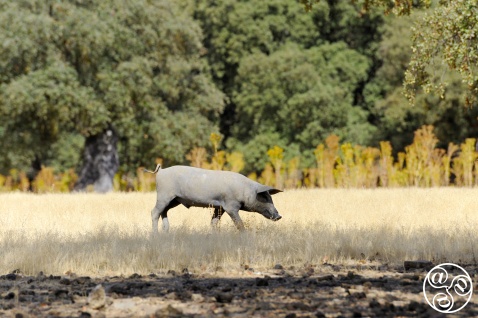
The Iberian pig, the small brown breed is native to Spain |
|
Classification for Iberico products
by Fiona Flores Watson
The official labelling system for Iberico products, including jamon iberico – cured ham, was introduced in 2014. There are two DOs (Denominacion de Origen) of jamon iberico in Andalucia: Jamon de Huelva in the Sierra de Aracena (northern Huelva province) centred around Jaburgo and Los Pedroches (Cordoba) in the Sierra Morena and the Los Pedroches in the north of Cordoba province. In the Alpujarras, the village of Trevelez is famous for its ham made from white pigs, but they come under a different system as a (PGI) Protected Geographical Indication.
The labelling system makes jamon iberico product labels much simpler, so you know exactly what you’re buying – what the animal was ate and where, and whether it’s a pure iberico. The labelling takes into account three main factors:
The breed of pig
The Iberian pig, the small brown breed native to Spain, is the finest jamon producer. Some pigs will be 100% Iberian, with both parents pure-bred. Others will be part Iberian mixed with another breed – mother pure Iberian and father mixed; the percentage of Iberian must be specified so its exact genealogy can be traced.
What it was fed on
There are now three categories, down from four: bellota (acorns), cebo del campo (natural grazing) or cebo (fodder).
Where it was raised
Allowed to roam free (eating acorns or grazing naturally), or kept enclosed in a pen (and fed fodder). When being raised free-range, the number of pigs allowed per hectare is 0.25-1.25. For those in captivity, pigs weighing over 110kg must have a minimum of 2 square metres each.The length of time ham is cured for is strictly controlled, and a minimum weight of leg is being introduced. These are the colour-coded labels:
BLACK LABEL - Jamon 100% Iberico de Bellota
This is the top category – the finest available – and indicates a pure-bred Iberian pig which has been fed only on acorns during the montanero period (October to February). It is free-range, being allowed to roam around the dehesa.
RED LABEL - Jamon Iberico de Bellota
This is a pig which is part-Iberian – the percentage of Iberian breed must be specified. The pig has been allowed to roam free, eating acorns.
GREEN LABEL - Jamon Iberico de Cebo de Campo
This pig is at least 50% Iberian, and has been allowed to roam freely, eating both natural grazing and fodder.
WHITE LABEL- Jamon Iberico de Cebo
This pig is at least 50% Iberian, and has been kept enclosed in a pen and given fodder.
The system also applies to paleta (smaller front legs – jamon is typically the hind leg) and caña de lomo (loin) made from Iberico pigs. Images, logos and symbols are strictly controlled – pictures of acorns and dehesa (savannah-like open woodland with oak trees) can only be used on the label for an Iberian pig which actually ate bellotas, and roamed on this type of land. All Iberian hams bear the colour-coded labels.


